Animal shelters do incredible work giving pets a second chance. Some animals arrive at shelters in shocking condition, but they still step up to give them the love and care they need.
That was the case for a dog named Libby, who had a tumor the size of a volleyball. But now, her story has a happy ending.
In August, the Humane Society for Tacoma and Pierce County, in Washington state, took in a stray pit bull named Libby. They said the dog was “full of life” and had a “sweet face and kind eyes.”
However, Libby also had a serious medical concern: a 10-pound tumor the size of a volleyball, one of the largest masses they had ever seen:
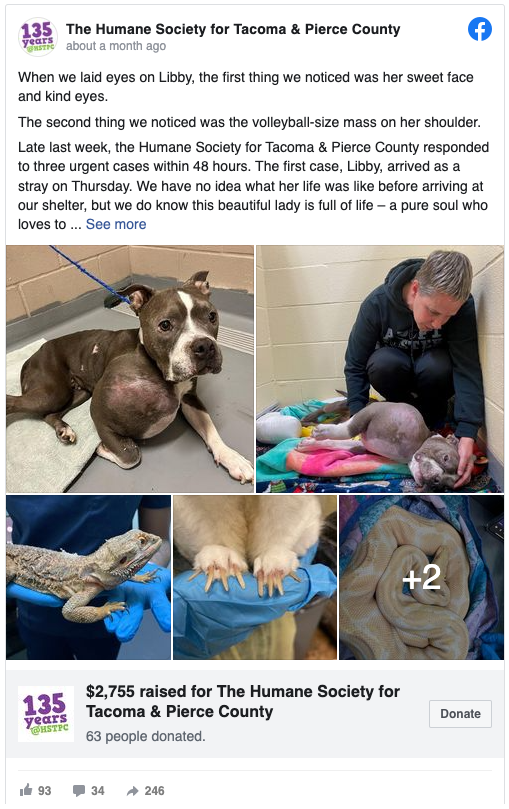
Libby arrived at a hectic time for the shelter: HSTPC says Libby was just one of three urgent cases they responded to in 48 hours, and as Washington’s largest-intake shelter dozens of new animals were arriving every day.
Despite that, they resolved to give Libby the best possible care, even though they weren’t sure what the future had in store for the poor dog.
“She deserves the most compassionate care possible, but we don’t know what her outcome will be at this time,” the shelter wrote in August. “Our veterinary team is working on every possible option and will start with testing to understand what kind of tumor Libby has. For now, she is receiving pain medication to ease her discomfort and endless love from our staff.”
After giving Libby an x-ray, they discovered the tumor was in the bone of her upper right leg, and would require amputation. Reactive inflammation caused the tumor to swell to its unusual size, and was causing her agonizing pain.
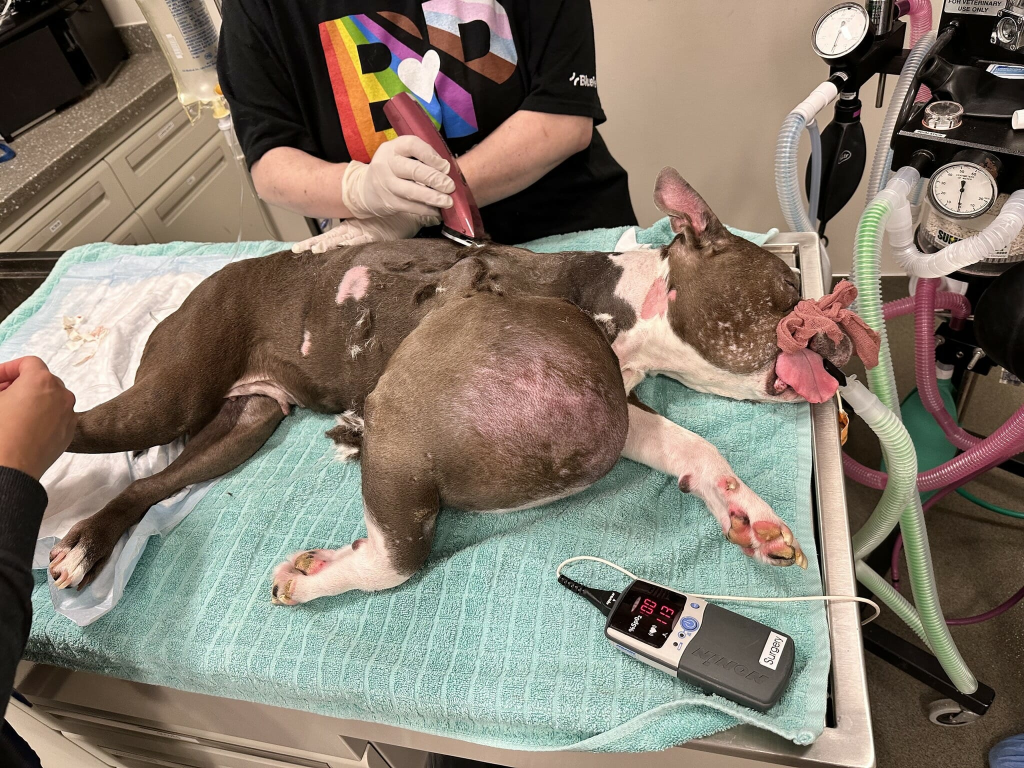
Through generous donations from supporters, the shelter was able to pay for Libby’s leg amputation. The surgery, done by the vet staff at BluePearl Pet Hospital, was a success and Libby was finally free of the pain she had been living through.
Sadly, even though her tumor was gone, she was diagnosed with aggressive bone cancer, and her time on earth might be limited. But in happy news, Libby has found a home!
According to HSTPC, a vet tech fell in love with Libby and agreed to adopt her. Even though she knows that Libby might not live long, she wanted to fill her remaining days with love.
“There’s something in her eyes that begs for love and safety,” her new adopter said, according to a Facebook post. “I couldn’t turn away from that.”
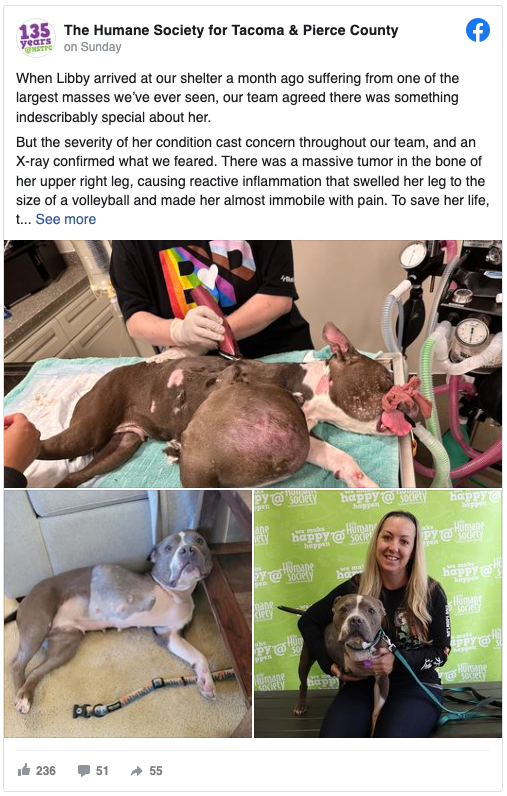
Libby has now been renamed “Wiggles” and is enjoying her new home, playing with her dog brother and family and taking lots of cozy naps on the couch.
“Though we’re uncertain how much time she has left, we know she’ll spend her remaining days
The moment the heroic rescue team valiantly battled against the clock to liberate the unfortunate dog trapped in the underground bunker left everyone overwhelmed with emotions
In a heart-pounding rescue operation, a dedicated team of heroes faced a race against time to free Ziggy, a 10-year-old Patterdale terrier, from a perilous underground bunker. This harrowing ordeal left everyone on edge as they fought tirelessly to save a beloved pup trapped in a dire situation.

Ziggy had been enjoying a carefree day on his family’s farm, frolicking alongside his mom when an unexpected turn of events sent him spiraling into a dark abyss—an underground drain pipe. At first, his mom wasn’t overly concerned; after all, this wasn’t Ziggy’s first escapade into subterranean exploration. But as the minutes turned into hours, and Ziggy failed to reappear, panic set in.

Lauren Flintoft, Ziggy’s mom, shared her worry, saying, “I was worried he might have been stuck, and that’s why he didn’t appear. My husband Tim spent the whole night trying to entice him out, and when he didn’t emerge, I called in help.”
Desperate for aid, Flintoft reached out to the RSPCA (Royal Society for the Prevention of Cruelty to Animals) with hopes that they could assist in rescuing Ziggy from his precarious predicament. A team of dedicated rescuers promptly arrived at the scene, ready to tackle the daunting task of locating and liberating the trapped terrier.

The operation was not for the faint of heart. Rescuers had to meticulously map the complex underground pipes, meticulously plotting their course to reach Ziggy. With unwavering determination, they began to dig two enormous holes, strategically positioned to expose Ziggy’s location.
Finally, after hours of relentless effort, the group spotted a glimmer of hope—a glimpse of Ziggy’s furry form within the confined space. With great care and precision, they gently cleared away the debris that held Ziggy captive, allowing him to wiggle his way to freedom. Remarkably, Ziggy had endured an astonishing 19 hours trapped in the drain pipe.
Despite his extended ordeal, Ziggy emerged from his subterranean prison unharmed, albeit a bit shaken. He was swiftly reunited with his relieved family, basking in the warmth of their embrace. This heartwarming rescue reaffirmed the unwavering bond between humans and their faithful canine companions.

Faebian Vann, an animal collection officer with the RSPCA, joyfully shared, “He’s now back home with his owners where he belongs, and no doubt he’ll be getting up to no good again very soon.”
Ziggy’s triumphant return serves as a testament to the extraordinary efforts of a dedicated rescue team and the power of compassion in the face of adversity. His story reminds us of the enduring spirit of our four-legged friends and the lengths we’re willing to go to ensure their safety and well-being.

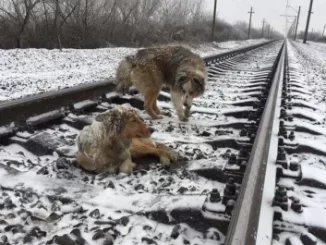
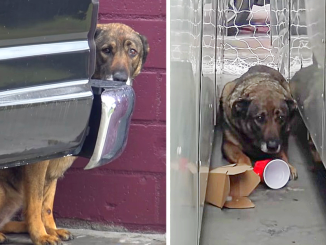
Leave a Reply